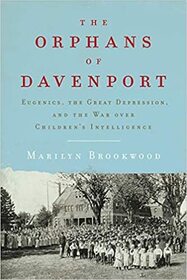Brookwood's The Orphans of Davenport is an enlightening look back at the hard-fought origins of childhood development. Little did I know that those annual IQ tests I took throughout grade school in the 1960s were the vestiges of America's once strong stance on eugenics (or how to use human reproduction to build a master race). How strong? The Nazis used many American laws and writings in their own bid to build the perfect race of human beings, that's how strong.
By the 1930s and the Great Depression, most psychologists believed that childhood development was solely a matter of heredity. If your parents were stupid, you were going to be stupid, too. End of story. Brookwood shows how eugenics was really racism disguised as science. Merely reading the names of various institutions back then shows us how far we've come: the New York State Custodial Asylum for Un-Teachable Idiots, the Home for the Friendless... People classified as morons, idiots, involuntary sterilization (mostly of women), orphanages used as warehouses... As I read, I was sickened, angered, and as I realized how some of these things were still happening today, my blood ran cold.
How did this all change? Brookwood takes us to Davenport, Iowa, and a small group of psychologists who were intelligent enough and brave enough to realize that some of the things they were seeing were direct contradictions to what they'd been taught as hereditists (childhood development is solely due to heredity). Two toddler girls whose combined IQ was 81 were sent to an institution for the "feebleminded" to be cared for by "moron" women since they were considered unfit for adoption. The two should have languished there for the rest of their lives. However, Harold Skeels and Marie Skodak found out that, under the women's care, those two girls' IQ scores actually became normal. This provided the basis for their groundbreaking work in childhood development-- that it's not all about nature; that nurture plays a huge role in a child's growth and mental health.
How did Iowa become the location for such crucial work? Because it was considered such a backwater that it was ignored. However, once Skeels, Skodak, and others began publishing their findings, all the hereditists in the country panicked and used every trick in their arsenal in an attempt to obliterate the upstarts' research.
The Orphans of Davenport is the inspiring story of how the dirty tricks did not win. Children no longer take annual IQ tests. Orphanages (really just warehouses for children) are a thing of the past. Many states' laws-- but not all-- abolished. I am so glad that I read this eye-opening book.
By the 1930s and the Great Depression, most psychologists believed that childhood development was solely a matter of heredity. If your parents were stupid, you were going to be stupid, too. End of story. Brookwood shows how eugenics was really racism disguised as science. Merely reading the names of various institutions back then shows us how far we've come: the New York State Custodial Asylum for Un-Teachable Idiots, the Home for the Friendless... People classified as morons, idiots, involuntary sterilization (mostly of women), orphanages used as warehouses... As I read, I was sickened, angered, and as I realized how some of these things were still happening today, my blood ran cold.
How did this all change? Brookwood takes us to Davenport, Iowa, and a small group of psychologists who were intelligent enough and brave enough to realize that some of the things they were seeing were direct contradictions to what they'd been taught as hereditists (childhood development is solely due to heredity). Two toddler girls whose combined IQ was 81 were sent to an institution for the "feebleminded" to be cared for by "moron" women since they were considered unfit for adoption. The two should have languished there for the rest of their lives. However, Harold Skeels and Marie Skodak found out that, under the women's care, those two girls' IQ scores actually became normal. This provided the basis for their groundbreaking work in childhood development-- that it's not all about nature; that nurture plays a huge role in a child's growth and mental health.
How did Iowa become the location for such crucial work? Because it was considered such a backwater that it was ignored. However, once Skeels, Skodak, and others began publishing their findings, all the hereditists in the country panicked and used every trick in their arsenal in an attempt to obliterate the upstarts' research.
The Orphans of Davenport is the inspiring story of how the dirty tricks did not win. Children no longer take annual IQ tests. Orphanages (really just warehouses for children) are a thing of the past. Many states' laws-- but not all-- abolished. I am so glad that I read this eye-opening book.




